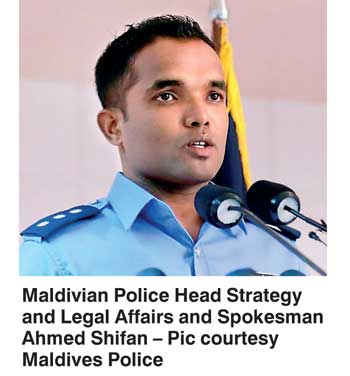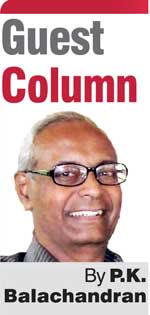Monday Feb 16, 2026
Monday Feb 16, 2026
Saturday, 28 October 2017 00:22 - - {{hitsCtrl.values.hits}}
 The Maldives, which is a 100% Islamic country, has been described by the West and the pro-West opposition Maldivian Democratic Party (MDP), as a hotbed of Islamic radicalism and a significant contributor to the Islamic State (IS) fighting forces in Syria. But this assessment is stoutly disputed by the Maldivian Police and the Government.
The Maldives, which is a 100% Islamic country, has been described by the West and the pro-West opposition Maldivian Democratic Party (MDP), as a hotbed of Islamic radicalism and a significant contributor to the Islamic State (IS) fighting forces in Syria. But this assessment is stoutly disputed by the Maldivian Police and the Government.
The Head of the Strategy and Legal Division of the Maldivian Police, Ahmed Shifan, points out that there has not been a single terrorist attack since 2007; that the West’s statistical interpretation is highly misleading; and that the unabated flow of hundreds of thousands of tourists from the West clearly shows the baselessness of the charge.
The Maldives has put in place systems of international standard to ensure the safety of its people and tourists who numbered 410,000 and 1,286,136 respectively in 2016. The hostile propaganda notwithstanding, the Maldives continues to attract well-heeled and fussy Western, Japanese and Chinese tourists. The UK alone accounted for over 100,000 last year.
But being a small country, living in the shadow of the powerful West, and also strategically located in the Indian Ocean, a country which has also become a playground of highly competitive democratic politics, the Maldives cannot ignore the charges made by the world’s powers and the local political parties linked to them.
The charge
The Maldives Times quotes an US-based security and risk management consultancy, the Soufan Group, to say that around 200 to 250 Maldivians are fighting in the wars in Syria and Iraq, making the Maldives, with a total population of 410,000, the highest foreign fighter contributor to the IS, “per capita”.
The “per capita contribution” was recently used by the US Assistant Secretary of State for South and Central Asia, Alice G. Wells, in one of her official testimonies on the Maldives.
But according to the Maldivian Defence Minister, Adam Shareef Umar, the number of Maldivians fighting in Syria is just 49.
For a 100% Islamic country 49 is a small number, the Government contends. And although Western countries issue travel advisories saying terrorist attacks or civil unrest could take place at any time, there has been no terrorist attack since 2007. In 2007, an explosive device planted in Sultan Park (now Rasrani Bageechaa) had injured 12 tourists from China, Britain and Japan. This was followed by a police-people violent clash in Himandhoo Island in Alif Alif atoll. A local Islamic radical group injured 30 unarmed police officers, when the latter had gone in search for the plotters of the Sultan Park blast.
There is no organised recruitment to the Islamic State (IS), but it is going on piecemeal and privately, by preachers trained in radical Islamic seminaries in Pakistan and Afghanistan (not Saudi Arabia interestingly) , Shifan says.
“With stepped up vigilance and organisations like the National Counter Terrorism Center, this has not grown into a major problem. Things are under control,” Shifan said.
According to Maldives Times in 2016, three Maldivians were arrested on the Turkey-Syria border and charged with terrorism. Another was arrested and repatriated in February this year. Two others who had allegedly fought with militant groups in Pakistan are currently standing trial in the Maldives.
In September, three Maldivians were arrested as they were trying to cross into Syria. Turkey arrested two others and repatriated them to the Maldives. Recently, two Maldivians with links to the ISIS, were arrested in
Malaysia. They were accused of “using Malaysia and Singapore as a transit point for proceeding to Syria”. So far, seven Maldivians have reportedly died in the fighting in Syria.
 The Maldives Times describes the case of a brilliant student with high scores in the A- Level exams being convinced by these powerful indoctrinators to abandon his family and country and leave for Syria to carry out Jihad and die in it to go straight to heaven. The boy’s educational certificates were burnt before being taken by air to Trivandrum in South India first, and then to Pakistan by the land route and finally to Syria.
The Maldives Times describes the case of a brilliant student with high scores in the A- Level exams being convinced by these powerful indoctrinators to abandon his family and country and leave for Syria to carry out Jihad and die in it to go straight to heaven. The boy’s educational certificates were burnt before being taken by air to Trivandrum in South India first, and then to Pakistan by the land route and finally to Syria.
Seven years with the IS convinced the boy that the IS’ leader were up to no good, justifying violation of every norm in the name of Jihad. He managed to escape and make his way to the Maldives. The other Maldivians in the IS also felt resentful, but would not leave, he said.
“With the help of foreign agencies including those of the US, we have been able to track down people trying to enter Syria. We have remanded them and put them through a de-radicalisation process,” Shifan, Director of Strategy Maldivian police, said
Maldivian way
The Maldives has devised its own way of tackling terrorism, applying force and stringent punishment where necessary and trying indoctrination, reformation and re-orientation in other contexts. There is also an over-arching scheme to teach people in schools and mosques a moderate Islam in tune with the Maldives ‘own historic Islamic tradition.
“We believe that reformation or re-orientation is better than punishment,” Shifan said.
Of course, those Islamic zealots who had committed crimes are punished. For example, the Prosecutor General has brought terror charges against people involved in the murder of blogger Yameen Rasheed and the abduction of journalist Ahmed Rilwan.
“The Ministries of Islamic Affairs and Home (Internal Security) along with the police conduct outreach programs in schools, both among students and teachers. We talk to Islamic preachers also. So far we have conducted nine outreach programs in the various atolls,” Shifan said.
“Islam is a compulsory subject in schools but the type of Islam taught is moderate. It is not Wahabism. In fact, there is no Wahabist group as such in the Maldives,” Shifan said.
There is however an Islamisation of Maldivian culture which is seen in an increase in the number of women wearing the hijab and men sporting beards. But this cannot and should not be interpreted as radical Islamisation of the political kind which believes in the physical elimination of non-adherents or intolerance of diversity, said Imjad Jaleel, a communication specialist in the Maldivian President’s Office.
“In the Maldives no one is forced to wear the hijab or grow a beard. What we see may well be a fashion trend,” he added.
But what the Maldivian Government is worried about is the tendency among some Western influenced bloggers to indulge in blasphemy, which does not go down well with the generally conservative and devout Maldivians. The Government also suspects that the West is using some NGOs and individuals to convert Muslims to Christianity. But Government believes that the only way to curb this is to stay with and propagate a moderate brand of Islam.
In response to Western concerns and also to protect tourism, the Government’s main breadwinner, the Yameen regime has enacted an anti-terror law in line with international standards and set up a National Counter Terrorism Center. And fortunately for the Maldives, its friend, Saudi Arabia, which has been the well-spring of Wahabism, is going to be non-Wahabi soon, thanks to Crown Prince Salman.